Introduction
As we enter 2025, e-commerce continues to redefine the global shopping experience. The rapid pace of change—driven by consumer behavior, innovation, and digital transformation—demands real-time decision-making. This is where web scraping emerges as a game-changer, especially for businesses aiming to decode the Most Scraped E-commerce Product Categories in 2024.
In today's hyper-competitive environment, Web Scraping Top-Selling E-commerce Products 2024 has laid the foundation for predictive analytics, agile marketing, and responsive supply chains. Advanced scraping tools and AI-driven analysis empower businesses to spot bestsellers, benchmark pricing, and decode demand patterns across global marketplaces.
By analyzing the Most Frequently Scraped Products Online 2024, businesses can identify where interest peaked, which categories were most watched, and how buying intent shifted across regions and seasons—information that remains highly relevant going into 2025.
Why Top-Selling Product Data from 2024 is Still a Goldmine in 2025?
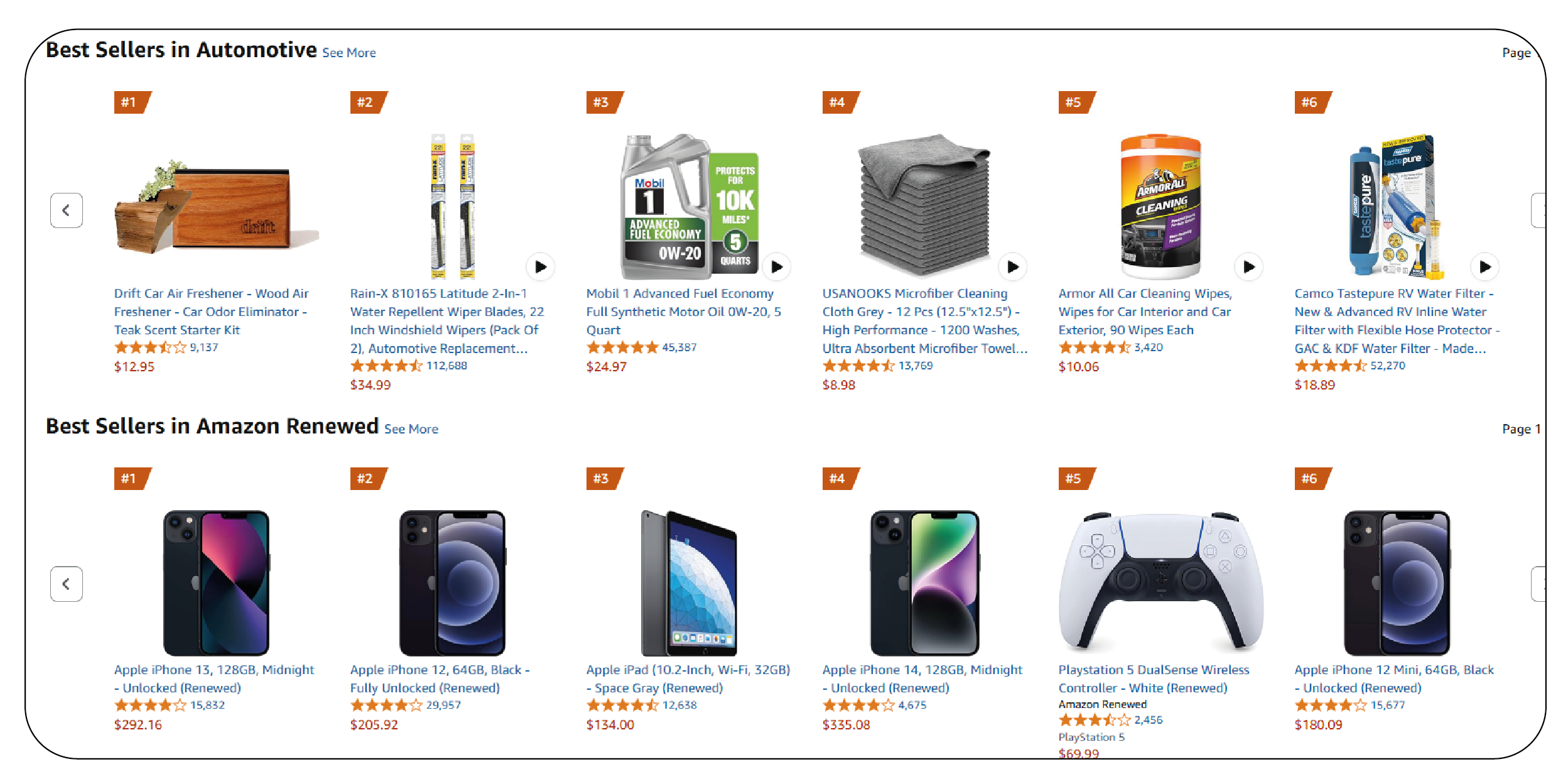
2024 was a landmark year for digital retail, reshaping how businesses approach data-driven decisions. By understanding the Most Scraped Products in Online Shopping in 2024, companies gain a strategic advantage that still drives success in 2025. Here's a detailed look at how organizations continue to extract value from historical e-commerce data:
- Predictive Product Development: Companies leverage insights from the Top Scraped Product Categories in E-commerce 2024 to design and develop products that align with consumer interests. Businesses can accurately predict demand trends and craft offerings with higher market acceptance by analyzing customer preferences, product popularity, and buying intent from 2024.
- Price Intelligence & Optimization: Historical pricing data, gathered through advanced Ecommerce Data Scraping Services , helps businesses make real-time pricing decisions in 2025. Competitor price tracking from 2024 enables dynamic pricing strategies, allowing brands to remain competitive and maximize profit margins without losing market share.
- Geographic Market Entry: Companies can identify underserved or high-potential markets using regional sales trends and bestseller maps. This intelligence supports informed decisions when expanding into new territories, ensuring product-market fit and reducing launch risk.
- Behavioral Analysis: Behavioral trends extracted from the Top Scraped Product Categories in E-commerce 2024 provide valuable insights into seasonal buying habits, purchase frequency, and consumer loyalty signals. These behavioral cues help shape marketing campaigns, loyalty programs, and engagement tactics that resonate with target audiences.
- Inventory Management: By leveraging historical trends with the help of the a
E-commerce Product & Review Dataset , businesses can optimize inventory levels based on past replenishment cycles and top-selling products of 2024. This minimizes overstocking or stockouts, ensuring that supply aligns with expected demand patterns in 2025.
In conclusion, detailed knowledge of the Most Scraped Products in Online Shopping in 2024 continues to guide strategic decisions today. By utilizing robust E-Commerce Data Scraping Services, businesses not only stay ahead of trends but also turn past data into future growth.
Most Scraped Product Categories in E-commerce – 2024 Highlights
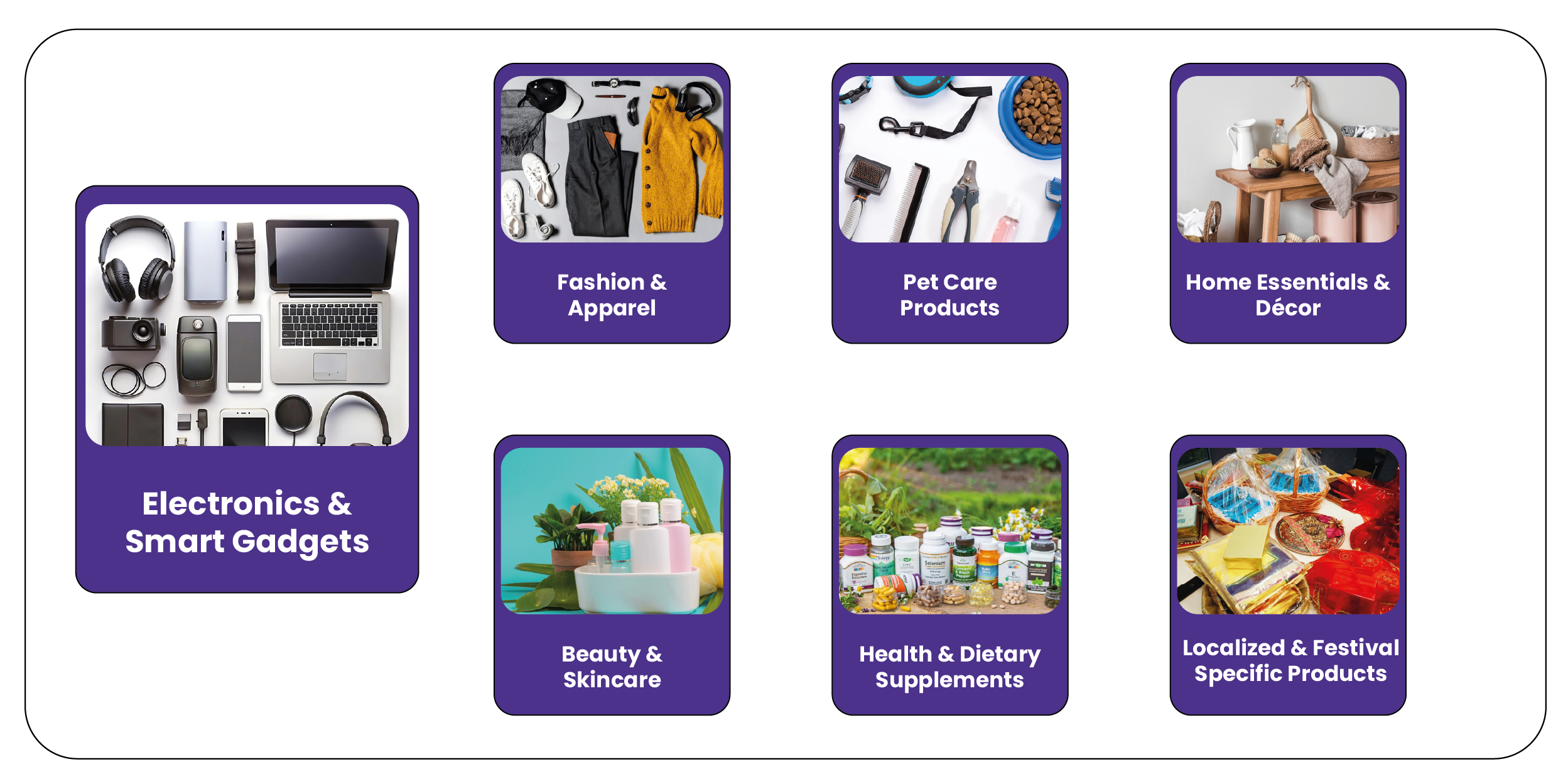
Based on industry-wide scraping trends, these categories emerged as the most frequently extracted from e-commerce platforms in 2024:
-
Electronics & Smart Gadgets: The demand for smart home devices, AI-powered health monitors, Bluetooth earbuds, and wearables skyrocketed. Platforms like Amazon and Flipkart saw constant scraping of pricing, specs, and availability data.
-
Beauty & Skincare: Sustainable and clean beauty became a top priority. Vegan products, Korean skincare, and dermatologically tested items were among the most scraped across Sephora, Ulta, and niche stores.
-
Fashion & Apparel: Micro-niche fashion terms ruled: "coquette aesthetic," "cargo tech pants," and "K-pop inspired fits" were among the most tracked. Shein, ASOS, and Zara pages were frequently scraped to catch real-time trend shifts.
-
Pet Care Products: Premiumization of pet products drove spikes in scraping. Items like organic treats, GPS-enabled collars, and monthly subscription boxes trended on Walmart, Chewy, and Amazon.
-
Health & Dietary Supplements: Products with specific functional claims—"Ashwagandha gummies," "collagen peptides," and "magnesium sleep aid"—were widely scraped for price comparisons and user reviews.
-
Home Essentials & Décor: E-commerce platforms saw consistent scraping activity around ergonomic furniture, energy-efficient lighting, smart thermostats, and minimalist décor—especially during seasonal sales.
-
Localized & Festival-Specific Products: From Ramadan gift boxes to Diwali ethnic wear, region-specific product categories were heavily scraped during festive seasons, and language-specific marketplaces surged in activity.
Table: E-commerce Platforms with Most Scraped Products in 2024
| Rank |
E-commerce Platform |
Most Scraped Categories |
Region |
| 1 |
Amazon |
Electronics, Health, Fashion |
Global |
| 2 |
Walmart |
Grocery, Home & Pet Supplies |
North America |
| 3 |
Flipkart |
Smartphones, Fashion, Furniture |
India |
| 4 |
Shopee |
Fashion, Beauty, Home Essentials |
Southeast Asia |
| 5 |
Etsy |
Handmade Crafts, Eco-friendly Beauty |
US, UK |
| 6 |
AliExpress |
Tech Gadgets, Apparel, Accessories |
Global |
| 7 |
Shein |
Women's Fashion, Accessories |
Global |
Real-Time Dashboards Built on Scraped Data
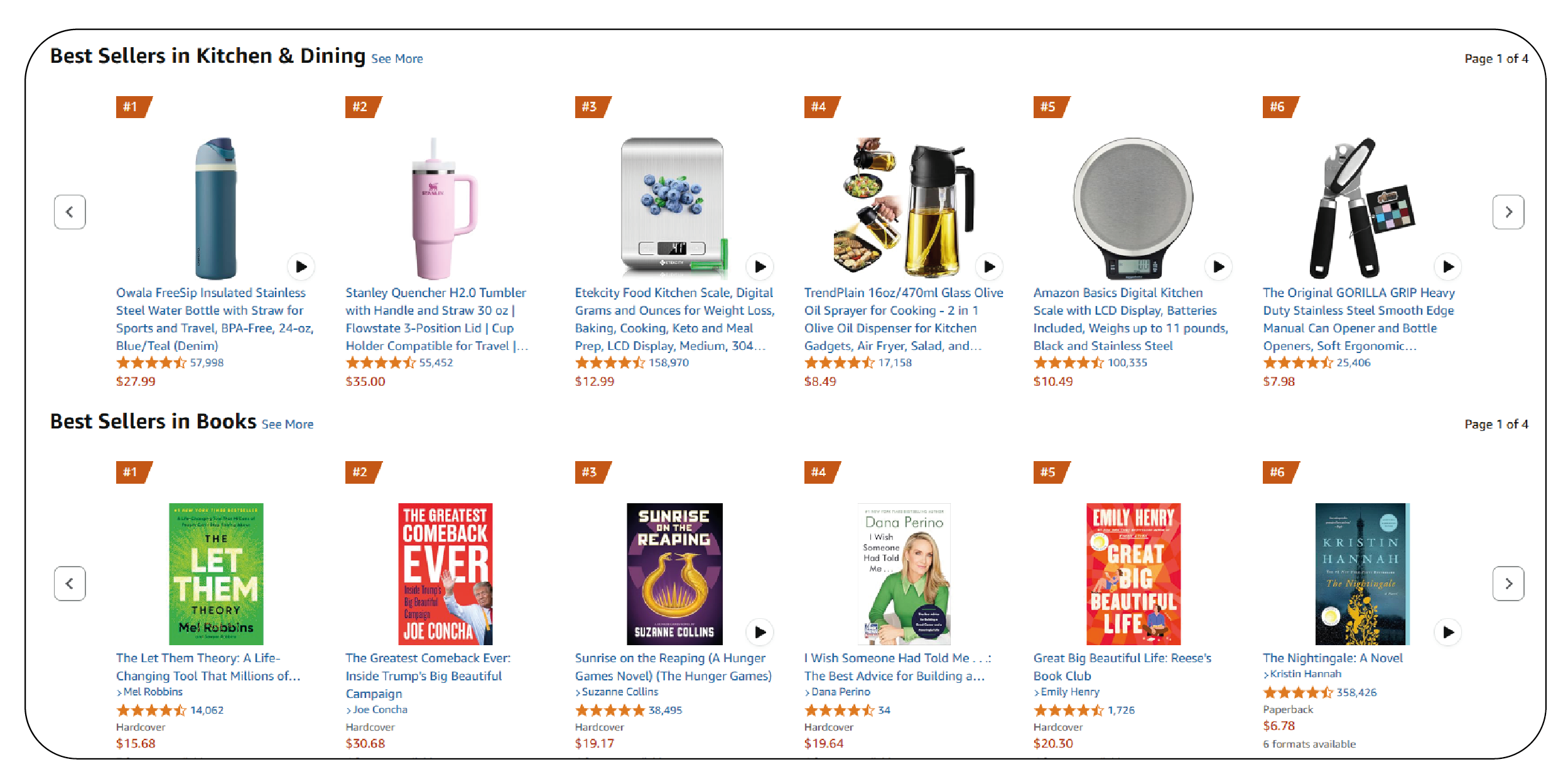
Real-time scraped dashboards rose in popularity during 2024 and remain critical in 2025. These offer:
- Live price and stock monitoring
- Bestseller rank updates
- Dynamic trend spotting
- Competitor tracking with review sentiment
Retailers, suppliers, and marketers use these insights to pivot campaigns, manage supply chains, and seize micro-moments in consumer demand.
How Retailers Used Scraped Product Data in 2024—and Still Do in 2025?
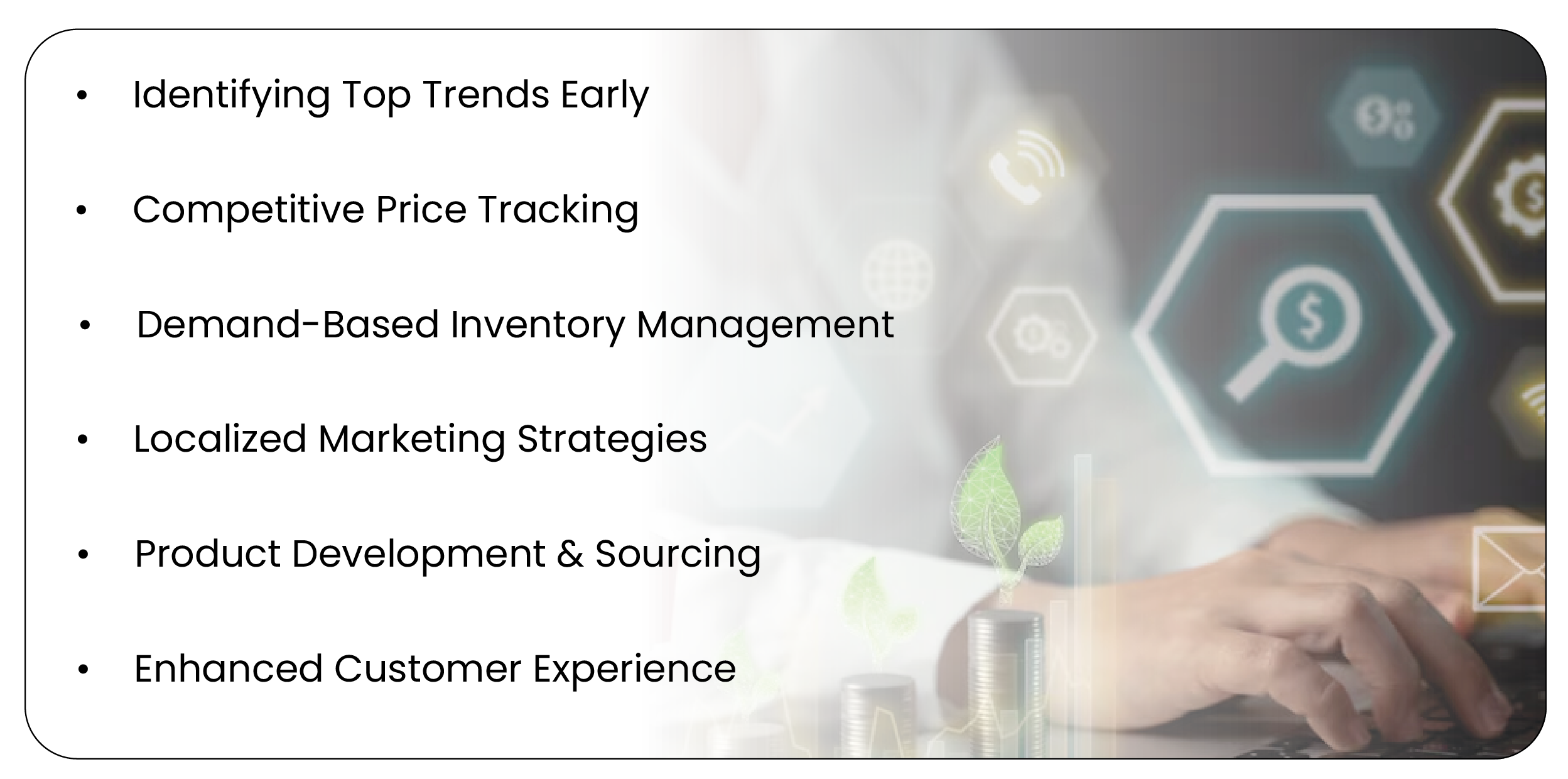
In 2024, the digital retail landscape grew fiercer and more data-driven than ever. Retailers who capitalized on timely, relevant, and accurately scraped product data managed to outpace competitors and dominate their niches. Here's a detailed look at how this strategy paid off:
- Identifying Top Trends Early: Retailers used scraping tools to Extract Popular E-Commerce Website Data, gaining real-time visibility into trending products across platforms like Amazon, eBay, and Walmart. This allowed them to react faster than competitors, adjust their offerings, and ride the wave of consumer interest before markets became saturated.
- Competitive Price Tracking: Through consistent efforts to Extract E-commerce Data, retailers monitored fluctuating competitor prices, promotional offers, and discounts across thousands of SKUs. This gave them the ability to apply smart pricing strategies such as undercutting competitors, dynamic pricing during peak hours, and optimizing profit margins while staying attractive to consumers.
- Demand-Based Inventory Management: With insights gained from Web Scraping E-commerce Websites , businesses aligned their stock levels with actual market demand. This eliminated the risks of overstocking slow-moving items or understocking hot sellers, resulting in improved cash flow and customer satisfaction due to better product availability.
- Localized Marketing Strategies: Retailers segmented scraped product data by geography, tailoring their campaigns and inventory to local preferences. For example, a product that performed exceptionally in urban markets was heavily promoted in similar metro areas, leading to higher conversion rates and reduced marketing waste.
- Product Development & Sourcing: By analyzing customer reviews, ratings, and frequently bought items using scraped data, retailers refined their product development pipeline. They focused on features consumers praised and addressed issues raised in reviews, giving them a customer-centric advantage in both white-labeled and private-label product categories.
- Enhanced Customer Experience: Data on purchase patterns and browsing behavior allowed for highly personalized shopping experiences. From recommending the right products at the right time to curating bundles based on scraped trend data, retailers improved both user engagement and cart size.
In summary, retailers that strategically chose to Extract Popular E-Commerce Website Data, gained unmatched insights into market behavior. This empowered them to stay agile, customer-focused, and ahead of the competition in 2024’s highly dynamic e-commerce space.
Industries Leading the Charge with Product Scraping
- Electronics – Version tracking and specs benchmarking
- Apparel – Seasonal trend detection and niche category discovery
- Beauty – Bundling ideas and review analysis
- Home Goods – Price fluctuation tracking across regions
- FMCG – Speed-to-shelf comparisons for fast-moving items
- Wellness – Demand forecasting for niche supplements
Need help extracting the right product insights? Connect with us to build a web scraping strategy tailored for your market.
Contact Us Today!
What’s Next: Future of Scraping in E-commerce (2025 & Beyond)
-01.webp)
- AI Predictive Models – Forecast future bestsellers
- Visual & Image Scraping – Analyze product aesthetics and packaging trends
- Sentiment-Driven Scraping – Map emotional tone in reviews to product ratings
- Voice Commerce Scraping – Monitor Alexa/Google-based product requests
How Product Data Scrape Can Help You?
- Custom-Built Scraping Solutions Tailored tools to target specific categories, geographies, or marketplaces.
- Real-Time Monitoring Automated tools track pricing, availability, and reviews across platforms.
- Category Intelligence Insights from top-selling and most scraped product segments.
- Scalable Collection Systems Extract data from thousands to millions of SKUs with ease.
- Clean Datasets Delivered in ready-to-use formats—CSV, JSON, Excel, or API.
Final Thoughts
In 2025, the true leaders in e-commerce are those who continue to harness insights from the most scraped product categories of 2024. By analyzing past consumer behavior—what people clicked, searched, and purchased—businesses can accurately forecast future demand. Historical e-commerce data is more than a record; it’s a roadmap for anticipating trends, refining product strategies, and staying ahead of the competition. With the right combination of data scraping tools, strategic planning, and intelligent analysis, companies can turn yesterday’s shopping patterns into tomorrow’s winning moves. Success in digital retail now depends on how well you learn from the past.
At Product Data Scrape, we strongly emphasize ethical practices across all our services,
including Competitor Price Monitoring and Mobile App Data Scraping. Our commitment to
transparency and integrity is at the heart of everything we do. With a global presence and a
focus on personalized solutions, we aim to exceed client expectations and drive success in data
analytics. Our dedication to ethical principles ensures that our operations are both responsible
and effective.

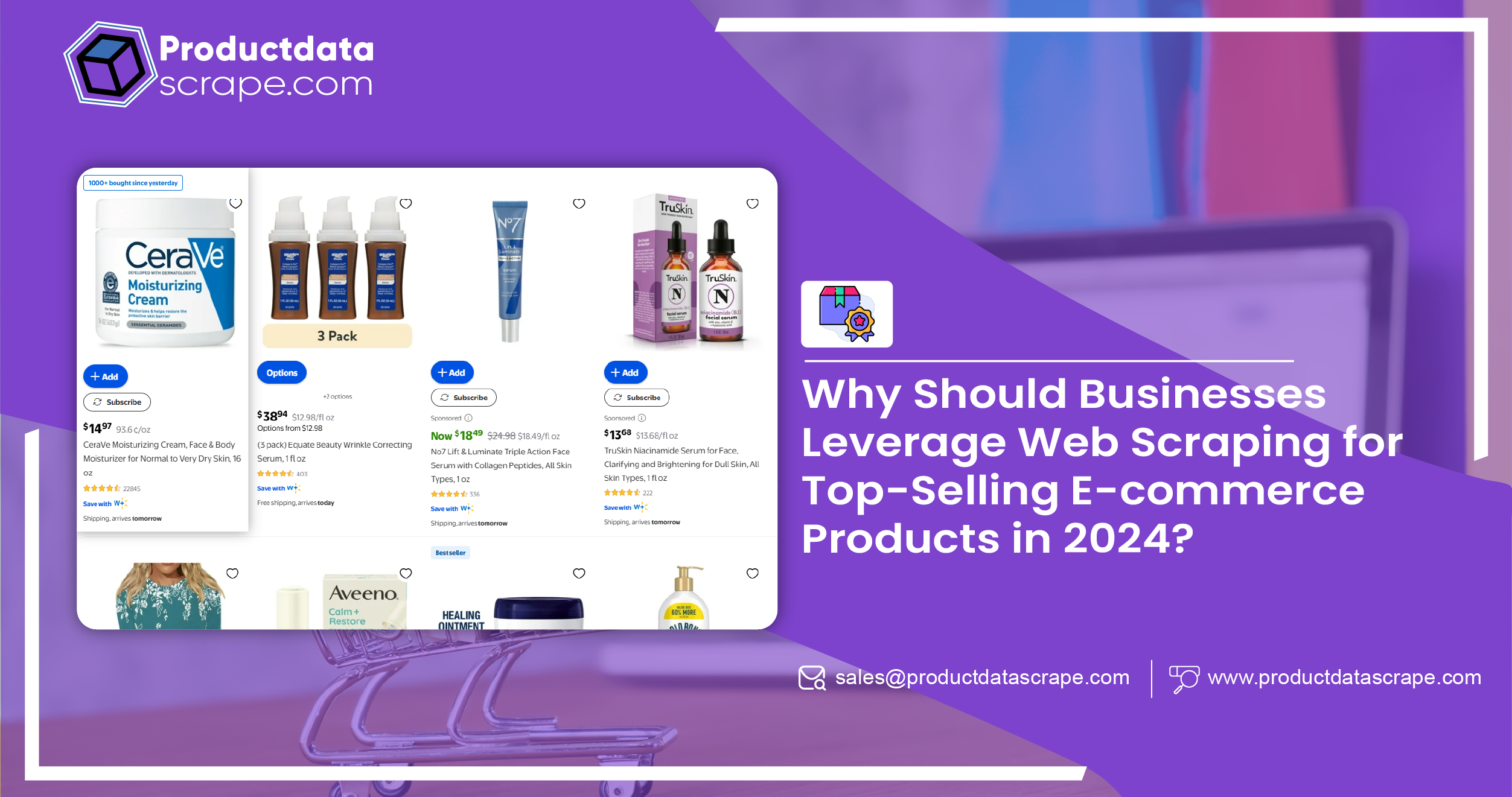




-01.webp)































.webp)




.webp)
.webp)
.webp)